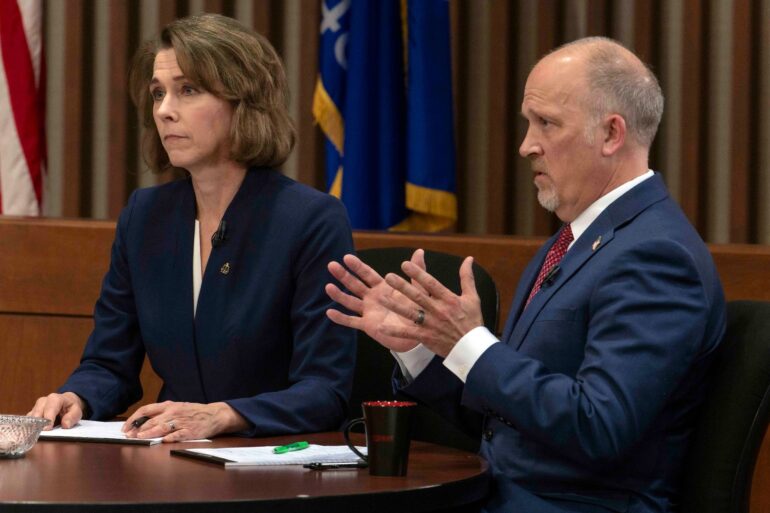🔴 Website 👉 https://u-s-news.com/
Telegram 👉 https://t.me/usnewscom_channel
Wisconsin’s early spring elections for its Supreme Court were historically sleepy affairs, with minimal implications outside the Badger State.
Not this year.
While the state’s abortion law and its congressional redistricting process are getting attention, next Tuesday’s ostensibly nonpartisan election between Democrat Susan Crawford and Republican Brad Schimel is shaping up to be a belated referendum on Act 10, the sweeping cost-saving reforms enacted under Gov. Scott Walker in 2011.
A socialist hotbed in the early 20th century, Wisconsin in 1959 was the first state to pass a law allowing public-sector collective bargaining — that is, the unionization of government employees.
In the private sector, a labor union can only demand what a company is able to pay. Insist on too much, and prices risk going higher than customers are willing to spend. But that normal balance doesn’t exist in government, where officials almost reflexively pass these costs on to taxpayers.
The problem with that approach, to borrow from Margaret Thatcher, is that officials in Madison eventually ran out of other people’s money.
The Global Financial Crisis and the Great Recession rattled state and local finances. Tax receipts fell and pension obligations grew.
Tackling budget gap
Walker tackled the resultant multibillion-dollar budget gap in his first months with Act 10.
It overhauled the collective bargaining process under which state and local governments negotiate with their employee unions (a dynamic neatly described by my colleague Daniel DiSalvo as “government against itself”).
Act 10 made unions collect their own dues instead of having government offices deduct them from employee paychecks. It put the onus on the unions to periodically win re-election in secret ballots, since most workers had never had a say on whether to be represented by a union.
And it limited what terms and conditions of employment, like the size of raises, could be controlled by union contracts instead of directly by the people’s elected representatives.
With these privileges gone, union membership in Wisconsin’s public sector fell: 47% of public employees there belonged to one in 2010, according to the academic researchers at UnionStats.com. Last year it was 18%.
Little wonder that the unions have sought to destroy Act 10 for more than a decade.
Following a public-union challenge, the Wisconsin Supreme Court upheld the reforms in their entirety in 2014. The majority held that the rules around collective bargaining for public employees are set by state legislatures and can be changed — or even eliminated — by them.
But two judges dissented, giving labor hope that they could kill Act 10 another day.
That opening arrived when the composition of the court tilted in Democrats’ favor in 2023, and unions quickly launched their latest attempt to turn back the clock.
A Dane County trial judge last year rejected parts of Act 10 as unconstitutional because they treat “public safety employees” like police officers and firefighters differently from other public workers.
It’s a specious argument: States routinely draw arbitrary distinctions between the bargaining privileges of different groups, in part because collective bargaining was authorized for them at different times with separate laws.
In New York, for instance, the bargaining privileges of some public workers varies solely based on the county by which they’re employed.
Some of the biggest cost-savings that came from Act 10 — changes to employee pension and health-care contributions — remain unchanged for now. The Dane County case, now on appeal, will likely go before the Wisconsin Supreme Court in coming months.
It’s likely to be a nail-biter. One member of the court, Judge Brian Hagedorn, has recused himself, given his involvement with crafting Act 10 as Walker’s counsel.
Refuse to recuse
Meanwhile, Judge Janet Protasiewicz rejected calls for her recusal, despite having marched in an anti-Act 10 protest.
Nuking parts of Act 10 would be costly for local governments and school districts — and thus for taxpayers — as unions would be free to make greater demands both in terms of compensation and how public services get delivered.
More importantly, it would also reinvigorate Wisconsin’s public employee unions — allowing them to pass along cash to their national headquarters, and in turn, to bankroll other union-led efforts in all 50 states.
The duration, and the intensity, of Wisconsin’s ordeal is a costly lesson for other states, such as Virginia, where a longtime ban on public-sector bargaining was lifted in 2019.
Municipalities and school districts in the Old Dominion are coming under crushing pressure to allow the bargaining process, instead of elected officials, to set public policy. Several have already succumbed, setting locals up for higher costs and diminished services.
Some states are heeding that warning: Earlier this year, Utah banned public-sector collective bargaining. Lawmakers correctly distinguished between the compensation and treatment of employees and the privileges bestowed on government unions that are, by their nature, political organizations created to influence public policy.
Our federalist system has allowed decades of experimentation and demonstrated with a high level of certainty that public-sector collective bargaining, on net, hasn’t served the public interest.
But depending on Tuesday’s election, the Wisconsin Supreme Court could soon decide that doesn’t matter.
Ken Girardin is a fellow at the Manhattan Institute in New York.

